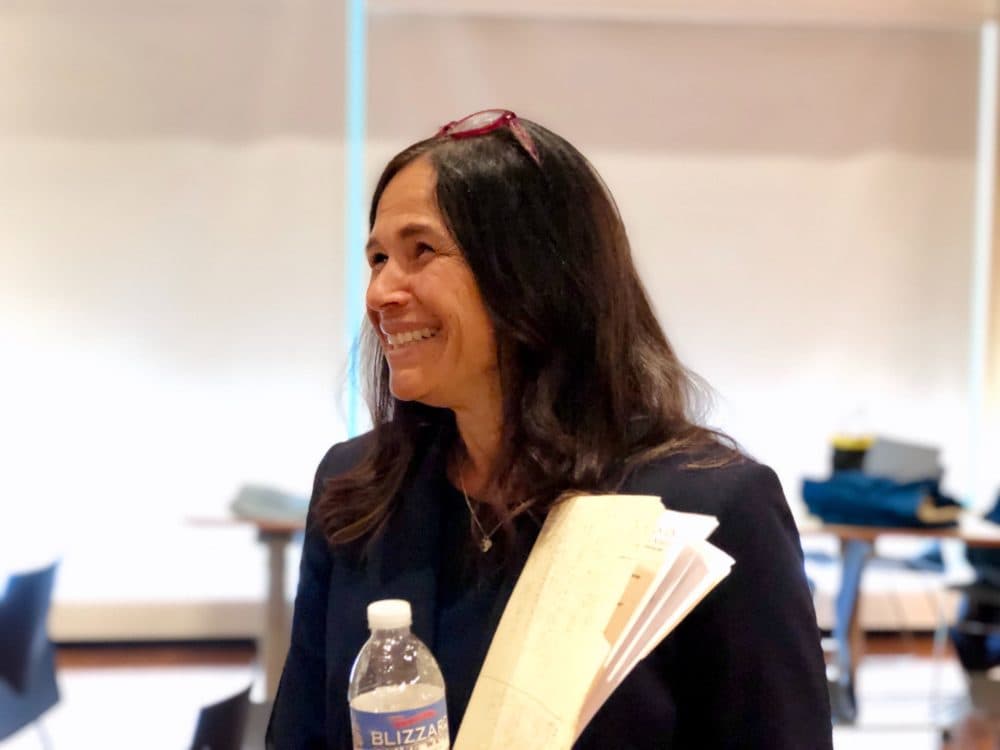Advertisement
Boston Superintendent Interviews: Cassellius Says She's 'Minnesota Nice' With 'Really Thick Skin'

Boston school leaders and community members interview three finalists under consideration for Boston Public Schools superintendent this week. Read highlights from the interviews with Marie Izquierdo and Oscar Santos.
It’s day two of the final phase of the search for the new superintendent of Boston Public Schools. Today, the floor belonged to Dr. Brenda Cassellius, a 51-year-old career educator and administrator.
Cassellius was Minnesota's commissioner of education until last January, when Mark Dayton, the governor who appointed her, stepped down. She said she's chosen to pursue this job because she's been looking for "a district that's ready to move the agenda for vulnerable kids" — and Boston could be that district.
But she's also a finalist for the top education job in Michigan, and interviewed for that post on Monday.
While Cassellius' resume shows that she has held almost every educational job there is, she has not been superintendent of a large urban district — despite being a finalist in the search for the Minneapolis superintendent in 2016. Here's what you need to know.
1. She says she's tough (and can handle the politics).
Cassellius said she's been told her "warm and fuzzy" act won't work outside the Midwest—only to find out that it does win people over to her side.
But beneath the "Minnesota nice" appearance, she said, is the "really thick skin" you'd expect from a passionate amateur hockey player.
In response to questions about Boston Mayor Marty Walsh's influence over the district policy, Cassellius made reference to the fact that her most recent job experience was an eight-year political appointment.
As education commissioner, Casselius worked with Minnesota's former governor, Mark Dayton on a number of initiatives, including building teacher diversity (that's still very much a work in progress) and expanding pre-kindergarten.
She also sparred with Republican lawmakers in 2017 as she tried to pass a plan that de-emphasized standardized testing in judgments of school quality (see below). It's proof, she said, that she can work within a political context and still pursue her own goals of helping vulnerable students.
2. She’s down on high-stakes testing.
For an education official, Cassellius spoke frankly—and negatively—about standardized tests. "If it doesn't help students learn better, or teachers teach better, I say don't do it."
Cassellius is not alone in deciding, in her words, that test-based accountability "hasn't worked." But she was unusually vociferous, saying that "I don't think that tests ought to be used for individual, high-stakes [decisions] for children, ever."
Cassellius also voiced her support for the burgeoning idea of performance-based assessments: projects that teachers design to measure student ability on a broader range of measures than standardized tests can conceive.
That said, Cassellius said she acknowledged that state officials, not district superintendents, set testing priorities, and collaborative leadership involves "agreeing to things you don't agree with."
3. In her view, public education has more responsibilities than we might think.
Related to Cassellius's skepticism of tests is her notion that schools represent more than just educational day care, especially in poor and urban communities. "Historically, we've coordinated the academic pieces," Cassellius said, "but we haven't really taken the responsibility to coordinate all of the other social services pieces."
Cassellius listed efforts she'd taken in Minnesota to work with state agencies and nonprofit organizations to provide mental health, housing and other resources to needy families.
And she said that the work ultimately intersects with her core academic mission: "When families are in crisis, you have to be able to give them the support and services to help them succeed — so that children are stable."
It's her passion to help vulnerable families, Cassellius said, that has her genuinely torn between the two jobs she's pursuing: she could oversee Flint and Detroit as Michigan's superintendent, or pursue the growth potential she sees in wealthier Boston on questions like inequality and chronic absenteeism.
4. Rather than come in with a detailed plan, she's electing to keep an open mind.
Cassellius conceded that her passions lie in "adaptive" work—reasoning out problems, collaborating, making compromises—as opposed to operational details (like getting transportation costs under control). But she said she's learned a great deal in the past eight years about handling procedural problems.
But there was some ambiguity — even vagueness — in some of her answers.
Asked about the controversial decision to close schools as part of Mayor Walsh's BuildBPS initiative, she described it as a "trade-off" that families should decide: do they prefer small schools or larger schools with more rigorous and diverse programming? She didn't express an opinion of her own.
And though Cassellius did describe herself as a "strong proponent of middle schools," she said she could endorse Boston's move away from standalone middle schools if it meant "less transitions" between schools for students.
But some parent-activists saw that ambiguity as a promising sign of Cassellius's open-mindedness. Mary Battenfeld, a member of the Boston parent group QUEST, said, "Her willingness to genuinely listen to the community — it bodes well."
The third and only local finalist, Oscar Santos, faces interviews Wednesday. Many onlookers say they'll be judging whether he can reach beyond a resume they view as more modest than the other two the city has interviewed.
